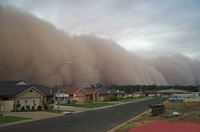Sumatra Begins to Return to Normal Life after Wednesday's Earthquake
On Sumatra, schools and marketplaces in the ravaged capital of Padang have begun reopening after last Wednesday's earthquake. This means that the city is returning to a semblance of normal life.

But far-flung areas north the city, constituting a million people, have barely been reached by outside aid, international aid organizations report, warning that the true test of relief has just begun. Thousands of people, meanwhile, are believed to be buried under rubble, with the United Nations listing the death toll at 1,100.
"You have populations there that are getting pretty desperate," says Sonia Khush, a spokesperson for Save the Children in Jakarta, the capital of Indonesia. "There's a million people in the north, and we're assuming about 70 percent of them were affected. It's really important that we start delivering relief right away."
The village of Sungai Sarik may be typical of the challenges faced in areas to Padang's north. Nearly 85 percent of homes there have been destroyed, according to an assessment by Catholic Relief Services (CRS), which has a team of 30 people working on the ground. As survivors huddle in makeshift tents, little relief has made its way there, Christian Science Monitor reports.
It was also reported, although rescue workers are still searching for missing people in collapsed buildings, they no longer expect to find anyone alive.
Hospitals are no longer overwhelmed with new quake victims. But patients are still being treated in tents because the hospitals themselves were damaged. Dr. Peter Sukman, a recent volunteer with Doctors Without Borders, says they need more permanent facilities.
"They have problems with the [medical] equipment and the places because most of the buildings are broke down," he said.
The United States military says it will build a temporary hospital in Padang within the next few weeks, Voice of America reports.
In the meantime, international aid workers fanned out across the collection of villages making up Padang Pariaman on Sunday and Monday, setting up posts for distributing food, water and medical supplies along the main road.
Aid groups, however, did not appear to have yet reached some of the winding back roads, where many residents who had lost their homes were sleeping beneath tarps. Children there lined the street desperately begging for donations from passing traffic.
Several hundred children went to school for the first time since the Wednesday quake, studying inside dozens of small schoolhouses set up by Unicef. Small businesses began to reopen as well, as did several of the city’s traditional markets, where residents busily bought and sold fruit, vegetables, fish and meat.
At the end of an alleyway in the Chinese quarter, an area affected particularly badly by the quake, a group of men hovered over a cockfight. Around the corner a father and his young son giggled as they played a game together, The New York Times reports.
Subscribe to Pravda.Ru Telegram channel, Facebook, RSS!


